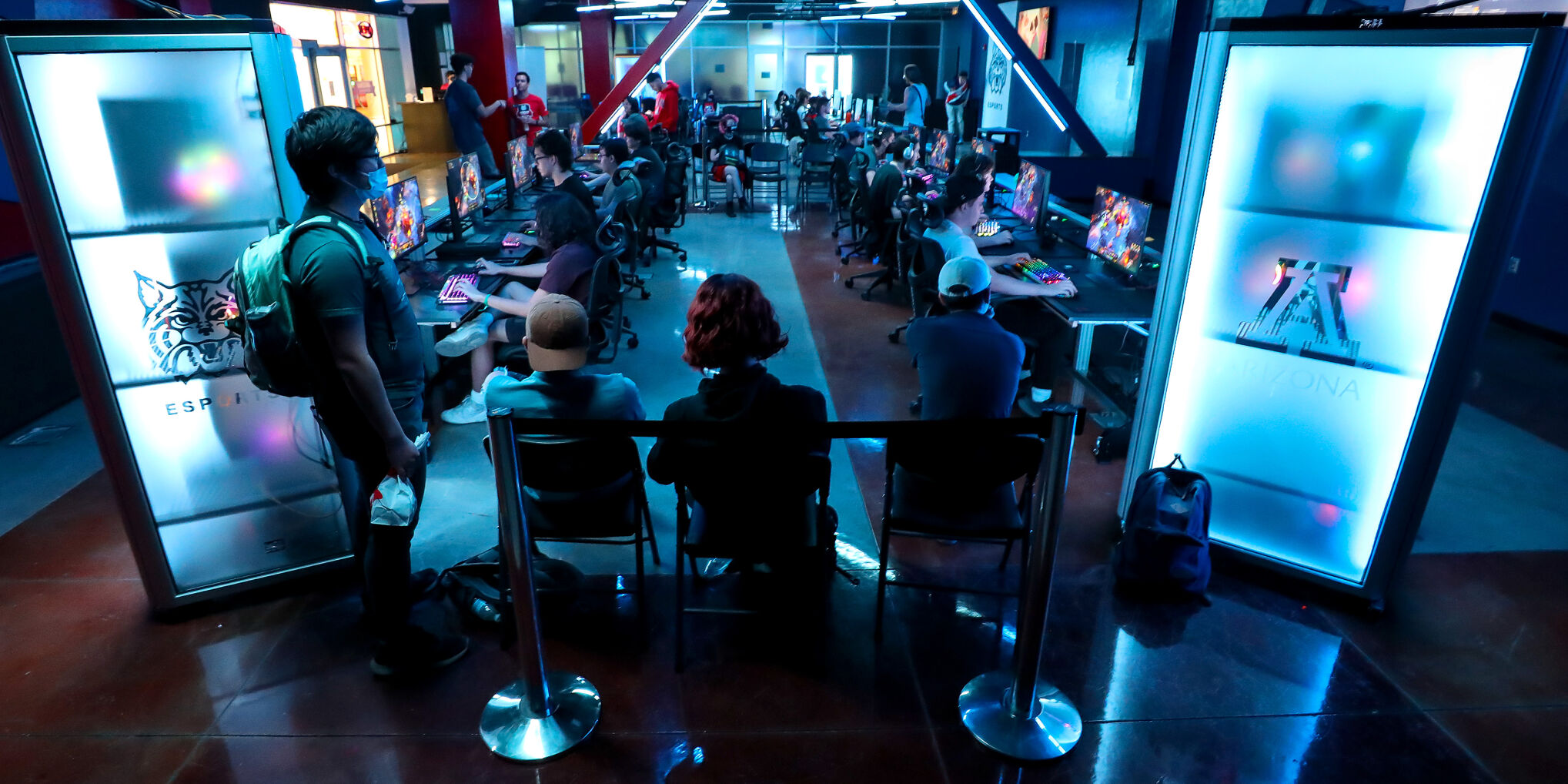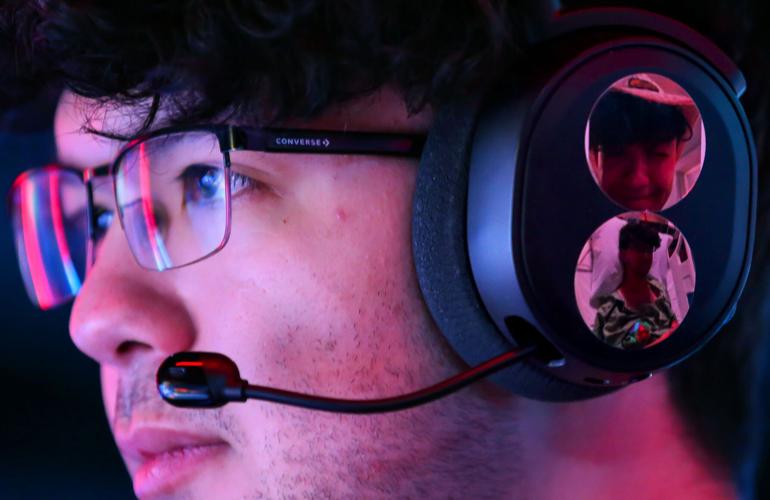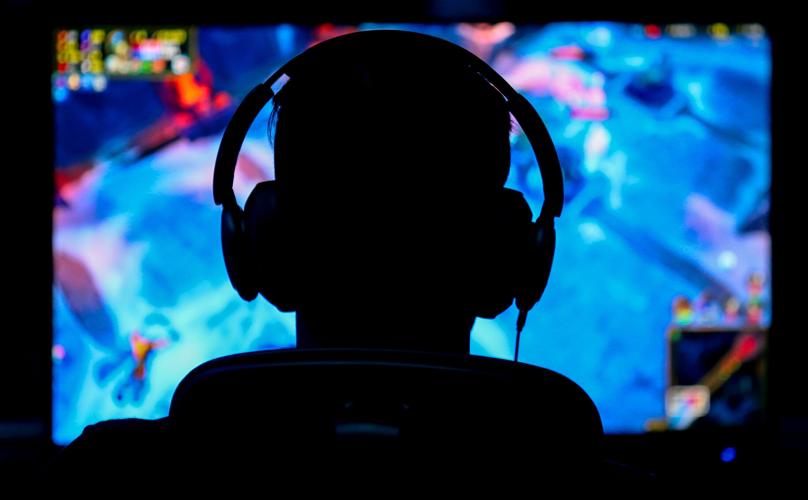Dozens of eager University of Arizona students flocked to campus last weekend for a much-anticipated sporting event.
But instead of heading towards Arizona Stadium for the Wildcats' spring football game, they headed to the student union and the UA's new, nearly $1 million Esports Arena.
They were there for the inaugural Coca-Cola Open, a sponsored three-day esports event that awarded cash and other prizes to the top players of the popular video game "League of Legends."
Esports is a catch-all term for competitive video or computer game-playing, often through organized, multiplayer competitions. Players compete individually or in teams.
It's not new to the UA: The UArizona Gaming Club (formerly the Esports Club) has been around for a decade. However, the opening of Esports Arena in August and the launch of the UA's esports program and varsity team in November shows the school wants to be a major player in the fast-growing sport.
Building a community for gamers
When Jenny Nguyen arrived at the UA as a freshman in 2017, she was determined to step outside of her comfort zone.
She never thought she'd become the first woman president of the school's decade-old gaming club. Under her leadership, the club now boasts 2,600 members. It's the largest student-only, student run club on campus.
Nguyen grew up in Tucson with two older brothers who she says were always on the family's PlayStation.
Now, she says, "I play more than both of them combined."
Nguyen found the esports club shortly after arriving on campus. She started designing graphics for the club and began going to recruiting events.

Riley Sena, senior psychology major playing on team 5t0oP1dK3v1n (StupidKevin), plays “League of Legends” wearing his headphones decorated with stickers of himself during the quarterfinals of this month’s Coca-Cola Open. The stickers are part of an inside joke between Sena and his friends.
Nguyen, 23, was named president of the club last year. Her first goal was to help the club distinguish itself from the new, school-sponsored program.
"Our main focus is being inclusive and being diverse," she said. "Our club has always been male-dominated, of course. When I joined, there were only about two other females. Now we have a lot more females in the club."
Nguyen said the increase in women is due in large part to her efforts to represent the club at various events over the years.
"Other females see me there and feel more comfortable approaching the booth," she said, adding that the club also makes an effort to showcase its women members on social media. "I'm graduating in May and trying to set the foundation for the next leadership."
That also means rebuilding the club's competitive roster. Many of its players left for the school-sponsored team when the UA's esports program launched last fall.
Nguyen's club has a handful of events scheduled for the final month of the semester. One is aimed at recruiting women for the club.
Nguyen, who is majoring in information science and esociety and is a first-generation college student, plans to pursue a career in esports or gaming.
"Being involved in the club has challenged me to step out of my bubble and in doing so I have made lifelong friends during my time here," Nguyen said. "I’m always talking to new people and putting myself in situations that my previous self wouldn’t have been able to do — that is how I got myself to where I am today."
Creating a space for competitive play
The UA's gaming club led the push for the new Esports Arena.
Kevin Buchmiller, a 2019 graduate, was there when it all began.
"When I joined in 2015, the student club was 20 people. It was just guys that wanted to play against other schools and you needed to have some sort of organization," he said. "My sophomore year, I got elected president. My vision was that we needed a designated space. We were in (the) Harvill (Building) on bench seating trying to figure out how to do this on laptops."
Club members put a plan together to grow the club using social media, search-engine optimization and events. One of them, a zombie-themed "Left for Dead" race, drew students in droves.

Gamers from other teams sit and watch teams play “League of Legends” during the quarterfinals of the Coca-Cola Open Esports Tournament.
By the time Buchmiller graduated, club membership had grown to more than 2,000 members.
It was time, they argued, for a facility of their own. The 2018-19 squad won a national championship in "Rocket League" — a game where cars play soccer — and netted $40,000 in scholarships for the players.
"It was just the perfect storm of, 'We have a great team, we have a great group of people, here's how much we think it will cost to do this. What do you think?'" Buchmiller said.
The provost's office agreed to cover the cost for the 40-terminal arena.
A launch party in October drew 380 people, and the arena has been a hive of activity since. The public can play for $4 an hour with a CatCard and $7 an hour without one. High school students are a common sight.
Like all successful teams, the esports squad helps draw students to campus. While gamers were setting up for the Coca-Cola Open, a high school student touring the campus with his mom wandered into the arena. He lit up when he saw the high-tech setup.
Buchmiller, who returned the the UA to oversee the arena's operations, said the place hums with activity on Friday nights and weekends. The arena's staff is split evenly among men and women.
"I think this is a great way to show that when you're a student here, you can really get things moving in the direction you want them to go," Buchmiller said. "Even now as staff, my goal is always to cater to what the students want and need."
Supporting a new breed of student-athletes
The UAs new esports program is its own department under the provost.
Director of Esports Ian Escalante oversees a varsity team of roughly 50 players. He came to the UA from Savannah College of Art and Design, where he held the same position for three years.
"I was able to essentially build the prototype of what we did there and apply that to what we're doing here," Escalante said.
Escalante spent most of his life involved in mainstream sports, including football, baseball, swimming, soccer and rugby.

A gamer plays “League of Legends” during the Coca-Cola Open Esports Tournament at the UA’s new Esports Arena in the Student Union.
"It was my mom's way of keeping me out of trouble," he said. "I loved the camaraderie and playing the games. That's the way I ended up leading into esports."
Playing that many sports, Escalante had his fair share of injuries over the years.
The Arizona Esports Arena at the University of Arizona houses 20 computer stations and four game consoles, which video game enthusiasts can pay to play by the hour. Video by Jesse Tellez/Arizona Daily Star.
"When I would get injured, the way I would keep in touch with my teammates and friends was video games," he said. "They were the way to scratch my competitive itch. It started with 'Madden' and led into 'Call of Duty' and then others."
Escalante said UA's esports team takes its sport as seriously as the Wildcats' traditional athletes do. The UA is one of 10 Pac-12 schools that regularly compete.
"There's a support system in place and the way the program is designed is to be a Division I varsity-athlete experience," Escalante said. "Our student-athletes are recruited onto the team and we have scholarship student-athletes. That helps them feel that they're getting rewarded for the time we're asking from them."
Escalante said playing on the team is "no longer just playing for fun" and that student-athletes are playing as a team.
This semester's team is the "Generation 1 prototype," he said. Players practice together once a week and are asked to play on their own at least one other day a week; Saturdays or Sundays are game days.
Things will be different when classes start back up in the fall. Players' schedules will be packed, and Escalante hopes to implement methods used in traditional sports — including nutritional support.
"Not so much controlling their diets, but educating them on their choices," Escalante said. "Things like 'Maybe don't abuse caffeine. These are some healthier food choices.'"
Like all coaches building programs from scratch, Escalante faces long nights and major challenges. But, he said, he wouldn't trade the work for anything else.
"I'm an old, broken sports jock that really ended up loving a lot of things esports could provide when I wasn't able to do what I used to do," he said. "They mean everything to me in that regard. This has been an amazing experience."
The Arizona Esports Arena at the University of Arizona houses 20 computer stations and four game consoles, which video game enthusiasts can pay to play by the hour. Video by Jesse Tellez/Arizona Daily Star.
Photos: 3-day esports tournament at University of Arizona
041722-tuc-spt-ua-esports-arena-p10.JPG
Updated
Patrick Pinder-Newton, sophomore mechanical engineer major playing for Team 7, smiles after Pinder-Newton and fellow teammates won game one against Team 6 in the semifinals in the Coca-Cola Open Esports Tournament hosted by Arizona Esports at The University of Arizona's new Esports Arena in the Student Union on campus in Tucson, Ariz. on April 9, 2022.
041722-tuc-spt-ua-esports-arena-p11.JPG
Updated
Jesse Paulley, junior cyber operations major playing on Team 6, plays League of Legends with fellow teammates during the quarterfinals in the Coca-Cola Open Esports Tournament hosted by Arizona Esports at The University of Arizona's new Esports Arena in the Student Union on campus in Tucson, Ariz. on April 9, 2022.
Coca-Cola Open Esports Tournment
Updated
Loki and the Dirty T's Haziq Qureshi, center, and Tyler Herman, graduate students, laugh while waiting to start game one of their semi-finals match against Flash on F during the Coca-Cola Open Esports Tournament hosted by Arizona Esports at The University of Arizona's new Esports Arena in the Student Union.
041722-tuc-spt-ua-esports-arena-p7.JPG
Updated
Yadeiliz "Jade" Mari, senior psychology major playing on team Flash on F, reacts while playing League of Legends during game one of the semifinals in the Coca-Cola Open Esports Tournament hosted by Arizona Esports at The University of Arizona's new Esports Arena in the Student Union on campus in Tucson, Ariz. on April 9, 2022.
Coca-Cola Open Esports Tournment
Updated
Riley Sena, senior psychology major playing on team 5t0oP1dK3v1n (StupidKevin), plays League of Legends wearing his headphones decorated with stickers of himself, as part of an inside joke with his friends, during the quarterfinals in the Coca-Cola Open Esports Tournament hosted by Arizona Esports at The University of Arizona's new Esports Arena in the Student Union.
Coca-Cola Open Esports Tournment
Updated
Gamers from other teams sit and watch teams play League of Legends during the quarterfinals in the Coca-Cola Open Esports Tournament hosted by Arizona Esports at The University of Arizona's new Esports Arena in the Student Union.
Coca-Cola Open Esports Tournment
Updated
A gamer plays League of Legends during the Coca-Cola Open Esports Tournament hosted by Arizona Esports at The University of Arizona's new Esports Arena in the Student Union.
041722-tuc-spt-ua-esports-arena-p2.JPG
Updated
Jacob "Homie" Morales, junior neuroscience major playing on team 5t0oP1dK3v1n (StupidKevin), plays League of Legends during the quarterfinals in the Coca-Cola Open Esports Tournament hosted by Arizona Esports at The University of Arizona's new Esports Arena in the Student Union on campus in Tucson, Ariz. on April 9, 2022.
041722-tuc-spt-ua-esports-arena-p3.JPG
Updated
Samuel Cormier, freshman playing on Team (F)or (F)un 15, plays League of Legends during game one of the semi-finals against Team 7 in the Coca-Cola Open Esports Tournament hosted by Arizona Esports at The University of Arizona's new Esports Arena in the Student Union on campus in Tucson, Ariz. on April 9, 2022.
041722-tuc-spt-ua-esports-arena-p4.JPG
Updated
Tomas Meskauskas, freshman civil engineering major playing on team ARAS G, plays League of Legends during the quarterfinals against Team 6 in the Coca-Cola Open Esports Tournament hosted by Arizona Esports at The University of Arizona's new Esports Arena in the Student Union on campus in Tucson, Ariz. on April 9, 2022.
041722-tuc-spt-ua-esports-arena-p8.JPG
Updated
A victory sign shows up on Jesse Paulley's, junior cyber operations major playing on Team 6, screen while Paulley and a fellow teammate congratulate team ARAS G for playing during the quarterfinals in the Coca-Cola Open Esports Tournament hosted by Arizona Esports at The University of Arizona's new Esports Arena in the Student Union on campus in Tucson, Ariz. on April 9, 2022.
041722-tuc-spt-ua-esports-arena-p12.JPG
Updated
Loki and the Dirty T's play League of Legends against team 5t0oP1dK3v1n (StupidKevin) during the quarterfinals in the Coca-Cola Open Esports Tournament hosted by Arizona Esports at The University of Arizona's new Esports Arena in the Student Union on campus in Tucson, Ariz. on April 9, 2022.
041722-tuc-spt-ua-esports-arena-p13.JPG
Updated
Patrick Hsu, junior neuroscience major playing on team Flash on F, plays League of Legends during game one of the semifinals against Loki and the Dirty T's in the Coca-Cola Open Esports Tournament hosted by Arizona Esports at The University of Arizona's new Esports Arena in the Student Union on campus in Tucson, Ariz. on April 9, 2022.
041722-tuc-spt-ua-esports-arena-p14.JPG
Updated
Ella DeWitt, Pima Community College student, watches her boyfriend play League of Legends with his team ARAS G during the quarterfinals against Team 6 in the Coca-Cola Open Esports Tournament hosted by Arizona Esports at The University of Arizona's new Esports Arena in the Student Union on campus in Tucson, Ariz. on April 9, 2022.
041722-tuc-spt-ua-esports-arena-p15.JPG
Updated
Tyler Herman, grad student playing on team Loki and the Dirty T's, plays League of Legends during game one of the semifinals in the Coca-Cola Open Esports Tournament hosted by Arizona Esports at The University of Arizona's new Esports Arena in the Student Union on campus in Tucson, Ariz. on April 9, 2022.
Coca-Cola Open Esports Tournment
Updated
Saul Murillo, junior informations sciences major and player on team Coca-Cola Enjoyers, warms-up before his teams game in the quarterfinals during the Coca-Cola Open Esports Tournament hosted by Arizona Esports at The University of Arizona's new Esports Arena in the Student Union on campus in Tucson, Ariz. on April 9, 2022.






